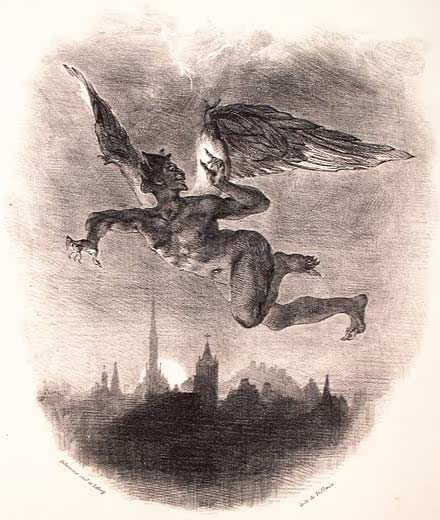Father of Lies
The Bible is inspired by God. His words are pure words: "The
words of the LORD are pure words: as silver tried in a furnace of
earth, purified seven times." (Psalm 12:6). To be pure means to be
without admixture of contaminating matter, such as 'error' in a book of truth. When fallen and error-prone speakers are quoted, the Bible
truthfully reports what these erring speakers said, for instance,
"The fool hath said in his heart, There is no
God." (Psalm 14:1).
"The fool hath said in his heart, There is no God."
(Psalm 53:1).
The Bible student who concluded it is accurate to say, "There is
no God," would err, because God's word is here telling us that "the fool" says
this, not that it's so.
"And Rabshakeh said unto them, Speak ye now to Hezekiah, Thus saith the great king, the king of Assyria, What confidence is this wherein thou trustest?.
. .But if ye say unto me, We trust in the LORD our God: is not that he, whose high places and whose altars Hezekiah hath taken away, and hath said to Judah and Jerusalem, Ye shall worship before this altar in Jerusalem?.
. . Neither let Hezekiah make you trust in the LORD, saying, The
LORD will surely deliver us, and this city shall not be
delivered into the hand of the king of Assyria. . . Hath any of
the gods of the nations delivered at all his land out of the
hand of the king of Assyria? Where are the gods of Hamath, and
of Arpad? where are the gods of Sepharvaim, Hena, and Ivah? have
they delivered Samaria out of mine hand? Who are they among all
the gods of the countries, that have delivered their country out
of mine hand, that the LORD should deliver Jerusalem out of mine
hand?" (2 Kings 18:19-35).
Although the quoted words are in the Bible, the implication
that trusting in the Lord is futile is blasphemy. The Bible
accurately quotes Rabshakeh's words, it does not endorse their
content.
How about Satan? Is he a speaker whose reputation gives the
listener confidence? He told Adam and Eve that sinning would bring
godhood: "For God doth know that in the day ye eat thereof, then
your eyes shall be opened, and ye shall be as gods, knowing good and
evil." (Genesis 3:5). Did they become gods, or only ruined
sinners doomed to death?"'Well,' some say, 'do you believe all Scripture is
given by inspiration?' Yes, every word of it; but I don't believe
all the actions and incidents it tells of were inspired. For
instance, when the Devil told a lie, he was not inspired to tell a
lie, and when a wicked man like Ahab said anything, he was not
inspired; but someone was inspired to write it, and so all was given
by inspiration and is profitable." (Dwight L. Moody, How to Study
the Bible, Kindle location 349).
In tempting Jesus, Satan boasted that he was the ruler of
the world. Was he telling the truth this time? Some
interpreters take it for granted that he was: "But we must
always remember that Satan 'controls the entire world' (1
John 5:19) and owns the authority of all governments (Luke
4:5-7) — including the ones we approve of." (Gregory A.
Boyd, The Myth of a Christian Religion, p. 28). Really, we
know that Satan holds rightful authority over this spinning
world, because he himself told us so?
But no doubt, he is in charge. Jesus refers to Satan as the ruler of this world:
"Now is the judgment of this world: now shall the prince of this world be cast out."
(John 12:31).
"Hereafter I will not talk much with you: for the prince of this world cometh, and hath nothing in me."
(John 14:30).
"Of judgment, because the prince of this world is judged."
(John 16:11).
In a similar vein Paul calls Satan the god of this world:
"In whom the god of this world hath blinded the minds of them which believe not, lest the light of the glorious gospel of Christ, who is the image of God, should shine unto them."
(2 Corinthians 4:4).
On what basis does Satan hold office? Is he, as they claim,
God's vicegerent?: "It was God who placed the cherub Lucifer on
the throne of the earth and Lucifer, who has become Satan the
Devil, remains on earth's throne only because God allows it, and
only until God sends Jesus Christ to sit on that throne when he
removes Satan." (Herbert W. Armstrong, Mystery of the Ages,
Kindle location 4178). Or does his rule rest on an entirely
different basis? Is his office an elective monarchy? How did he come
into power? By God's appointment, never rescinded though it didn't quite
work out, or man's rebellion?
Is he the people's choice, the freely chosen ruler of rebellious mankind? Or was he
personally chosen and appointed to this office by God, and is he
a god indeed as the Jehovah's Witnesses teach? In proof of their
claims, they offer Satan's own words in temptation of Jesus in
the wilderness:
|

